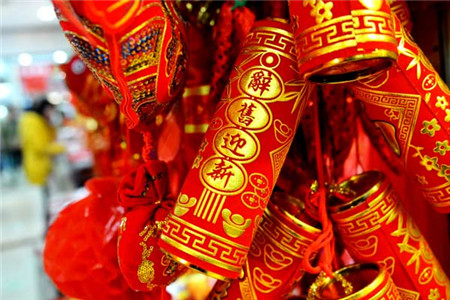 |
|
Top 5 Spring Festival customs in China [Photo/Asianewsphoto] |
Firecrackers
They were traditionally set off to frighten away ghosts and monsters so that the New Year would be free of them.
Legend has it that long ago there was a monster that terrorized people and animals at the end of the year. It was discovered that this animal was frightened of loud noises, bright lights, and the color red.
At midnight, on the last day of the old year, these things are used to chase away the monster until the next year.
You can hear or see fireworks and firecrackers everywhere, and this usually lasts for a few hours. Some people will continue to light them occasionally throughout the first half of the first lunar month.
Traditionally fireworks are a sign of getting rid of the old and welcoming the new. Today, firecrackers are used to add to the merry-making of the occasion.
Dumplings
People from the north and south have different traditional foods that they eat on this special day.
In Northern China, people usually eat jiaozi (or dumplings), which are shaped like crescent moons. It is said that dumplings were first cooked in China some 1,600 years ago.
The Chinese pronunciation of jiaozi means midnight or the end and the beginning of time.
According to historical records, in ancient times people from both north and south ate dumplings on Chinese New Year's Day.
Perhaps because Southern China produced more rice than any other areas, gradually, southerners had more food choices on New Year's Day.
The shape of jiaozi resembles that of ancient gold and silver ingots or a crescent moon, and symbolizes the hope for a year of plenty.
In some places, people stuff jiaozi with sugar to wish for a sweet life; others put one or two clean coins in jiaozi -- if you happen to come across one with a coin inside, it means you will enjoy good luck in the coming year.
Many families in China prepare enough jiaozi to last several days during the Spring Festival.
Dragon Dance
The Dragon Dance enjoys a vast diversity of models and forms. As a totem of the Chinese nation, among farming communities, it is still heralded as a token of the coming spring rains. It is also danced to drive away ghosts.
The dragons come in various forms, such as the cloth dragon, the grass dragon, the fire dragon and the segment dragon, and the dance varies from form to form. The cloth dragon has a visibly separated head and body, connected by cloth. The longer the dragon is, the more performers are involved. One person leads the dragon, guiding at whim the beast's rise and fall, from rapid undulations to slow ripples. It will alternately seem to fly up to the sky or hide under the ocean, imitating the movement of breaking waves.
The fire dragon takes its name from the candles placed along each section of the dragon body. When performed at night, firecrackers are set off, adding to the fiery surroundings of the sinuous puppet.
The grass dragon, also called "burning incense dragon", is built from rice straw and green vines, with burning incense contained inside it. Deployed during summer nights, the dragon is like a meteor attracting a lot of insects. When the performance is over, the dragon is lowered into a pool to drown the insects.
Usually, the Dragon Dance is performed by many people using stage props. The song and dance end as the stage props come together to form the head and tail of a dragon. The dance ends with the symbolic ascension of the dragon, pervading the audience with its elegance and uniqueness.

